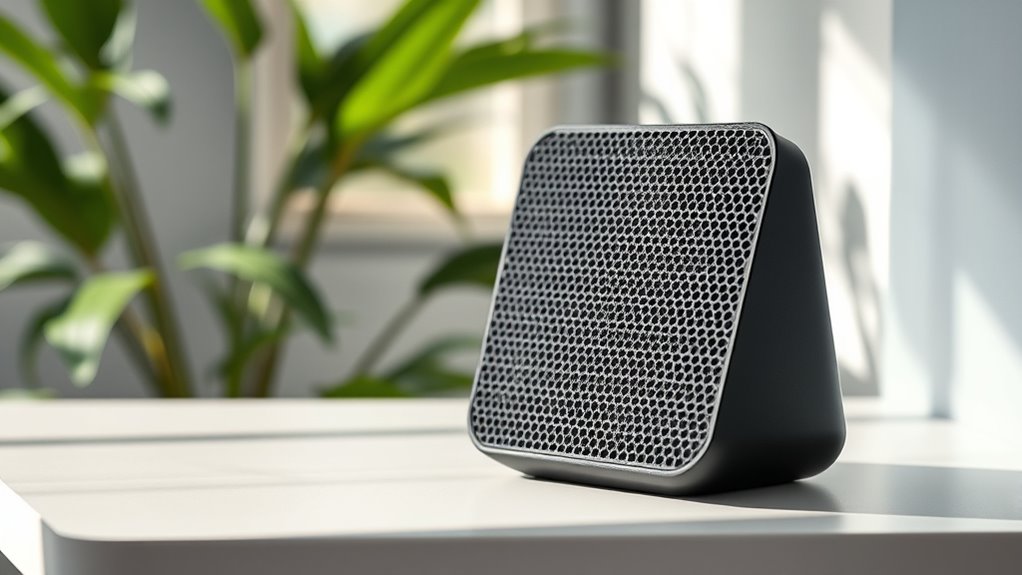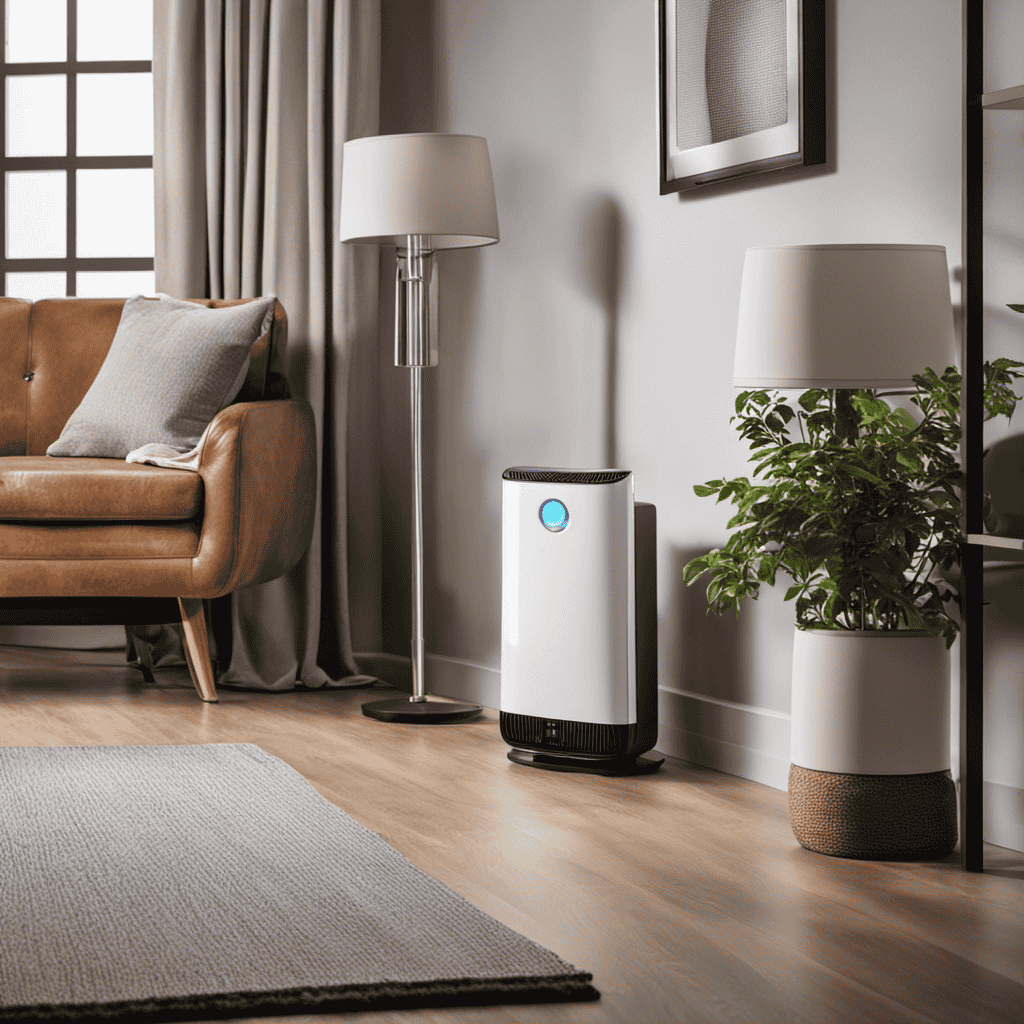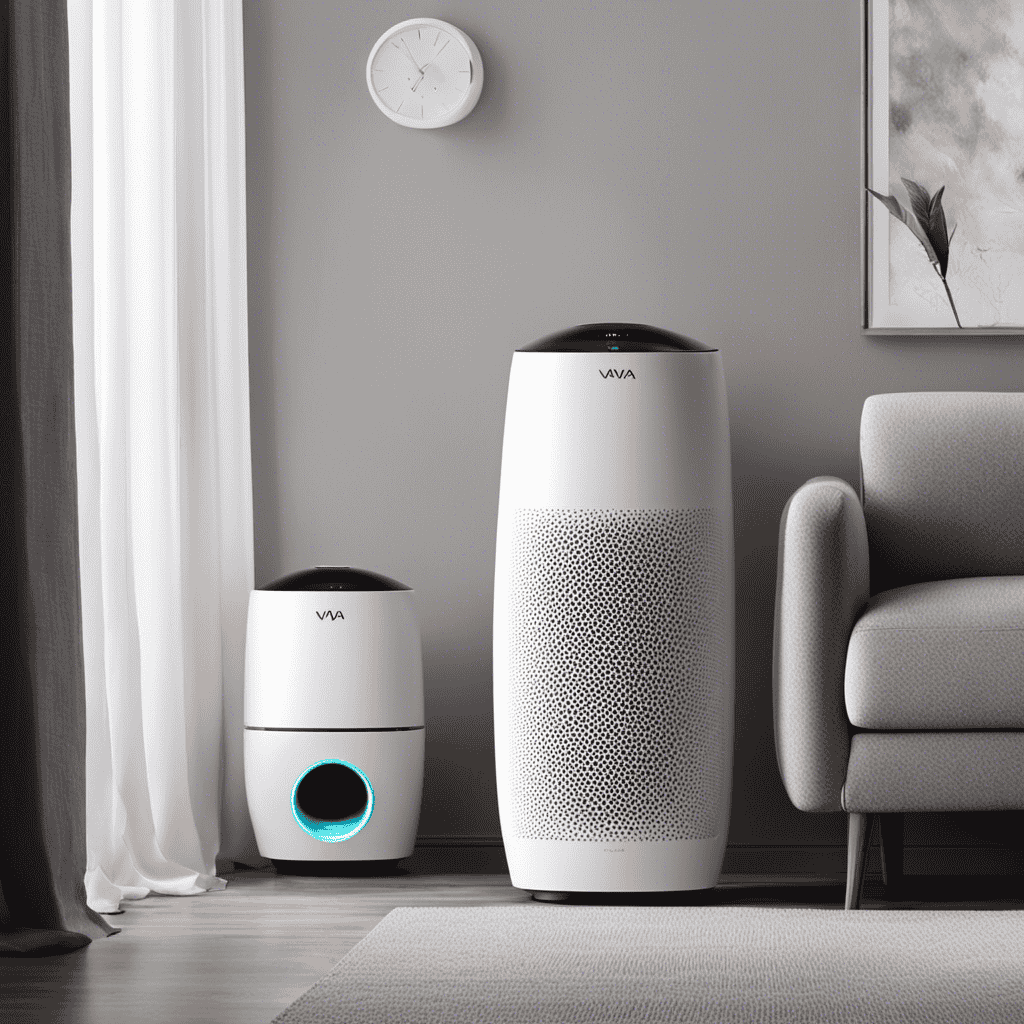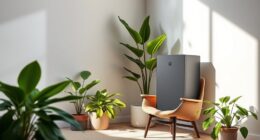Bamboo-charcoal filters are gaining popularity for their natural ability to remove formaldehyde and other indoor pollutants without chemicals. They trap airborne toxins, odors, and allergens effectively, improving your home’s air and water quality. Made from eco-friendly, reusable bamboo that’s charged by sunlight, these filters support a healthier environment and reduce waste. If you’re curious about how these natural solutions work and how they benefit your home, you’ll find plenty more to learn.
Key Takeaways
- Bamboo charcoal filters effectively absorb formaldehyde and other volatile organic compounds (VOCs) from indoor air.
- Their natural porous structure traps harmful particles, reducing exposure to formaldehyde and allergens.
- Made from eco-friendly bamboo, these filters offer a sustainable, chemical-free alternative to synthetic air purifiers.
- Reusable and rechargeable via sunlight, bamboo charcoal filters provide a cost-effective, long-term solution.
- They enhance indoor air quality naturally, supporting healthier living environments free from formaldehyde fumes.

Bamboo-charcoal filters have become a popular choice for improving water quality because they effectively remove impurities and odors. But their benefits extend far beyond just water; they’re also making waves in air purification. If you’re looking for a natural way to enhance indoor air quality, bamboo-charcoal filters are a smart option. They work by drawing in airborne pollutants, trapping harmful particles, and reducing unpleasant odors, all while being environmentally friendly. This makes them especially appealing if you’re committed to using eco friendly materials in your home. Unlike synthetic air purifiers that rely on chemicals or electricity, bamboo-charcoal filters harness the natural porous structure of bamboo charcoal to purify the air passively.
When you choose bamboo-charcoal for air purification, you’re opting for a sustainable solution. Bamboo grows rapidly without the need for pesticides or fertilizers, making it one of the most eco friendly materials available. The charcoal is processed with minimal energy, and the entire system is reusable—once the charcoal becomes less effective, you can simply recharge it by exposing it to sunlight. This reusability reduces waste and makes bamboo-charcoal filters a cost-effective choice in the long run. As you use these filters, you’ll notice a significant reduction in household odors—from cooking smells to pet dander—creating a fresher living environment. Their natural ability to absorb moisture also helps prevent mold and mildew, which can otherwise compromise air quality.
Beyond odor control, bamboo-charcoal filters are excellent at capturing airborne allergens and pollutants, such as dust mites, pollen, and other irritants that can trigger allergies or respiratory issues. Their porous surface increases surface area, trapping tiny particles that traditional filters might miss. Because they’re made from natural materials, they don’t emit harmful chemicals or VOCs (volatile organic compounds), making them safe for your family, especially if you have children or pets. The eco friendly aspect is a major selling point, as it aligns with a greener lifestyle and reduces your carbon footprint.
Frequently Asked Questions
How Long Do Bamboo-Charcoal Filters Typically Last?
Bamboo-charcoal filters usually last about 6 to 12 months, depending on usage and air quality. To maximize their filter lifespan, you should regularly shake off loose particles and keep them in a dry, well-ventilated spot. Maintenance tips include avoiding excess moisture and replacing the filter once it starts to smell or lose effectiveness. Staying on top of these tips helps make sure your bamboo-charcoal filter works efficiently longer.
Are Bamboo-Charcoal Filters Safe for Pets and Children?
Think of bamboo-charcoal filters as gentle guardians, silently working to purify your home. They’re generally safe for pets and children, effectively reducing toxins and odors, but always check for non-toxic, pet-safe labels. Prioritize filters with minimal environmental impact, ensuring they’re eco-friendly and responsibly sourced. Your little ones and furry friends can breathe easier, knowing you’re making choices that prioritize their safety and the planet’s well-being.
Can Bamboo-Charcoal Filters Remove All Types of Indoor Pollutants?
You might wonder if bamboo-charcoal filters can remove all indoor pollutants. While they’re effective at improving air purification by targeting odors, gases, and some airborne particles, they don’t filter out every pollutant, like viruses or fine dust. Their filter effectiveness depends on the specific pollutant and filter quality. For all-encompassing air cleaning, consider combining bamboo-charcoal filters with other air purification methods to cover a broader range of indoor pollutants.
How Often Should I Replace My Bamboo-Charcoal Filter?
Think of your bamboo-charcoal filter as a loyal garden gatekeeper, guarding your air daily. You should replace it every 3 to 6 months to guarantee ideal filter maintenance. This not only keeps your indoor air fresh but also reduces environmental impact by preventing the buildup of pollutants. Regular replacements allow your filter to continue its essential role, protecting your space and supporting eco-friendly choices.
Do Bamboo-Charcoal Filters Have Any Odor or Taste?
Bamboo-charcoal filters typically don’t have a strong odor or taste, so you might notice a pleasant aroma or a subtle taste when using them. This is because bamboo charcoal naturally absorbs impurities, leaving your water or air feeling fresh without any overpowering flavors. You’ll probably enjoy a cleaner, more neutral experience, making it easy to incorporate these filters into your daily routine without concern for unpleasant tastes or smells.
Conclusion
Imagine you’re breathing cleaner air thanks to a simple bamboo-charcoal filter. Like Sarah, who noticed her allergy symptoms eased after switching to a filter in her home, you can experience similar benefits. These eco-friendly filters naturally trap formaldehyde and pollutants, making your space safer and healthier. Embrace this trend, and you’ll breathe easier—no harsh chemicals needed. It’s a small change with a big impact, helping you create a fresher, safer environment effortlessly.










